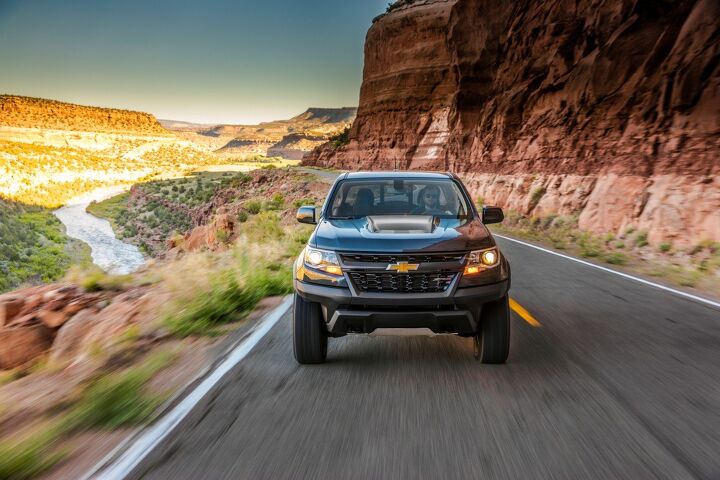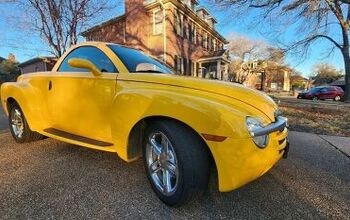Like GM's Current Midsize Trucks? Good, Because Colorado and Canyon Are Hanging Around Until 2022
General Motors evidently hopes you like the Chevrolet Colorado and GMC Canyon the way they are.
The midsize truck twins, which arrived in second-generation form nearly three years ago, won’t be replaced for another five years.
According to an Auto Forecast Solutions report cited by Autoline Daily, production of the next-generation Chevrolet Colorado and GMC Canyon won’t begin until 2022.
Of course, this doesn’t mean the Colorado and Canyon will forge ahead without updates. Already, General Motors has offered both trucks with a class-exclusive diesel engine, expanded the Canyon lineup to include a Denali model, and presented the Colorado ZR2 as the Raptor of the midsize truck world.
Expect further improvements, additions and alterations over the next half-decade.
Yes, another half-decade.
Pickup truck lifespans aren’t known to be short – this isn’t a ninth-gen Honda Civic that went from all-new in 2012 to facelifted in 2013 to all-new again in 2016.
Nevertheless, 2022 will be the eighth model year for the Colorado and Canyon. At the top of the pickup heap, the Ford F-150 transitions every six years on average.
But competition in America’s pickup truck arena is scarce, diminishing the need to be the newest and flashiest and freshest. Moreover, as the Colorado and Canyon reach old age, the Ford Ranger will arrive, likely spurring demand just as the Colorado and Canyon spurred greater overall interest in the midsize field in 2014 and 2015.
You’ll recall that, rather than merely grabbing its own slice of the pie, GM’s return to the segment was timed with best-ever Toyota Tacoma sales in 2015 and 2016; 2016 was also the Nissan Frontier’s best showing in 15 years. GM didn’t steal pie from Toyota and Nissan. GM expanded the pie.
If the Ford Ranger can do the same, then General Motors’ two midsize pickup trucks may also reap the benefits of renewed interest in the segment regardless of their old age.
Midsize TruckMay 2017May 2016% Change2017 YTD2016 YTD% ChangeToyota Tacoma17,65416,5446.7%78,15379,226-1.4%GM Colorado/Canyon11,56812,557-7.9%53,04256,142-5.5%Chevrolet Colorado9,0919,196-1.1%40,67042,178-3.6%GMC Canyon2,4773,361-26.3%12,37213,964-11.4%Nissan Frontier7,7567,941-2.3%29,66936,845-19.5%Honda Ridgeline2,956——15,8662793,200%Total39,93437,0427.8%176,730172,2152.6%Meanwhile, through 2017’s first five months, U.S. sales of midsize pickup trucks are up 3 percent. The Tacoma, Colorado, Frontier, Canyon, and Honda Ridgeline claim 16 percent of all pickup truck sales. Of the 176,730 midsize pickups sold in America so far this year, 30 percent are Colorados and Canyons.
That’s down from 33 percent a year ago as the Colorado and Canyon, like the Tacoma and Frontier, suffer measurable sales declines.
[Images: General Motors]
Timothy Cain is a contributing analyst at The Truth About Cars and Autofocus.ca and the founder and former editor of GoodCarBadCar.net. Follow on Twitter @timcaincars.
More by Timothy Cain
Latest Car Reviews
Read moreLatest Product Reviews
Read moreRecent Comments
- Jeff “So, the majority of our products are either ICE vehicles or intended to utilize those multi-energy platforms that we have. This is a great opportunity for us, compared to our peers, having the multi-energy platforms for all of our products in development and having the agility to move between them,” she said. From what is stated about the next generation Charger it will be released as a 2 door EV and then as a 4 door with the Hurricane turbo straight 6. I assume both the 2 door and 4 door is on the same platform.
- Brendan Duddy soon we'll see lawyers advertising big payout$ after getting injured by a 'rogue' vehicle
- Zerofoo @VoGhost - The earth is in a 12,000 year long warming cycle. Before that most of North America was covered by a glacier 2 miles thick in some places. Where did that glacier go? Industrial CO2 emissions didn't cause the melt. Climate change frauds have done a masterful job correlating .04% of our atmosphere with a 12,000 year warming trend and then blaming human industrial activity for something that long predates those human activities. Human caused climate change is a lie.
- Probert They already have hybrids, but these won't ever be them as they are built on the modular E-GMP skateboard.
- Justin You guys still looking for that sportbak? I just saw one on the Facebook marketplace in Arizona



































Comments
Join the conversation
I don't think it is as much of people who have aging compact and midsize trucks replacing them with newer midsize trucks but more like the crew cab pickup whether full size or midsize has become the replacement for the full size and midsize sedans. Not many fleets or older guys driving around in single cab and extended cab Rangers and S-10s are buying Colorados, Frontiers, Tacomas, and Ridgelines especially the crew cabs which seem to be what are selling the most. Without crew cabs there would be a lot less full size and midsize trucks being sold. A better comparison would be the rapid decline of the sedan as a family vehicle compared to the increase in crossovers and crew cab pickups. Sedans have become much less functional with smaller trunks and sloped roof lines that make for less headroom. There is also more profit in making and selling crossovers and crew cab pickups than the traditional sedan. Most fleet buyers and cheapskates will not pay 30k to 40k for a midsize crew cab pickup fully loaded and that is what is selling. Big Al's comment is spot on when you look at what midsize trucks are selling and compare that to the decline of the sedan. The Colorado is what the Chevy Chevelle Malibu of the past was and the Silverado is what the Chevy Caprice and Impala was of the past. The GMC Denali is today's version of the Buick Electra 225 and the Oldsmobile 98. The F-150 is today's Ford Galaxy 500, LTD, and Mercury Marquis. Ram is today's Dodge Polara. Since most of today's sedans lack the roominess and comfort of those of the past people have gone to crossovers and crew cab pickups which offer more room and capacity with available luxury packages.
8 years is a long time? Evidently not for Japanese automakers selling trucks here: The current Tundra is 10 years old, and no replacement has been announced (since they never reached their goal of selling 200k/year, seems like they pretty much have given up and figured a modified front fascia and tailgate will do for the posers who, for some unknown reason*, do buy it). The Frontier is 12 years old, and good luck getting a real answer about when it'll be replaced in North America, other than the new Navara sold elsewhere isn't for us. The Titan was 12 years old when it finally was replaced, and its still on the same platform as before. 8 years seems like a heartbeat compared to Nissan and Toyota's truck design cycles. *I know the reason! Because Consumer Reports says its reliable! That's what happens when you buy a truck and treat it like a Corolla.